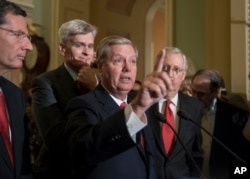Despite another failed attempt to deliver on a seven-year Republican promise to repeal the nation's health care law, U.S. President Donald Trump vowed Wednesday to continue to pursue a repeal, insisting Senate Republicans have enough votes that would be cast at a later time.
On Twitter, Trump stressed that the numbers exist, "with one Yes vote in hospital & very positive signs from Alaska," but not in time for a Friday deadline.
Trump's mention of Alaska was an apparent reference to Senator Lisa Murkowski, who represents the state. She said the latest attempt to repeal the Affordable Care Act, commonly known as Obamacare, was a rushed and "lousy process." Murkowski voted against Senator Republican leader Mitch McConnell's earlier bill, but did not indicate how she would vote on the latest measure.
The president did not say who he was referring to when he wrote the tweet about one 'yes' vote. Senator Thad Cochran has been recovering in his home state of Mississippi from what his office described as a "urological" issue, but an aide said Cochran was not in the hospital.
Senator John McCain of Arizona, who is battling brain cancer but is not currently hospitalized, opposed the latest legislation early on, as did Rand Paul of Kentucky. On Monday, Senator Susan Collins of Maine announced her opposition, robbing Republicans of the 50 votes needed to pass the measure in the upper chamber, where they have a 52-48 majority.
Republican leaders acknowledged Tuesday they did not have the votes under existing rules that required just 50 votes, plus a tie-breaker from Vice President Mike Pence. Those rules expire at the end of the week, and subsequent legislation would need 60 votes to overcome a filibuster.
Trump called for an end to the filibuster rule in another tweet Wednesday.
Later Wednesday, Trump told reporters outside the White House that the rule would delay the vote until early next year. "We'll have to do it in January or February. But I feel we have the votes," he said.
Senator Lindsey Graham of South Carolina, co-sponsor of the most recent heath care legislation, known as the Graham-Cassidy bill, said, "It's only a matter of when" it would be approved.
The Graham-Cassidy measure would convert funds from Obamacare into block grants for the 50 states. It would also cut funds for Medicaid, a program for the poor, to states that expanded it under Obamacare.
The nonpartisan Congressional Budget Office did not have enough time to estimate how many people insured under Obamacare would be affected by the Graham-Cassidy bill, but in an analysis released Monday evening, the CBO said, "The number of people with comprehensive health insurance that covers high-cost medical events would be reduced by millions."
A Brookings Institution analysis estimates about 21 million people would lose coverage under Graham-Cassidy compared with Obamacare through 2026, and eventually 32 million would lose coverage because of the block grant funding modifications.
WATCH: Senate Republicans Regroup After Health Care Defeat
Senate Democratic Leader Chuck Schumer of New York said Republicans' failure to approve the Graham-Cassidy bill leaves health care for millions of Americans intact.
"The reason this bill failed is that the majority of Americans didn't want it," he said.















